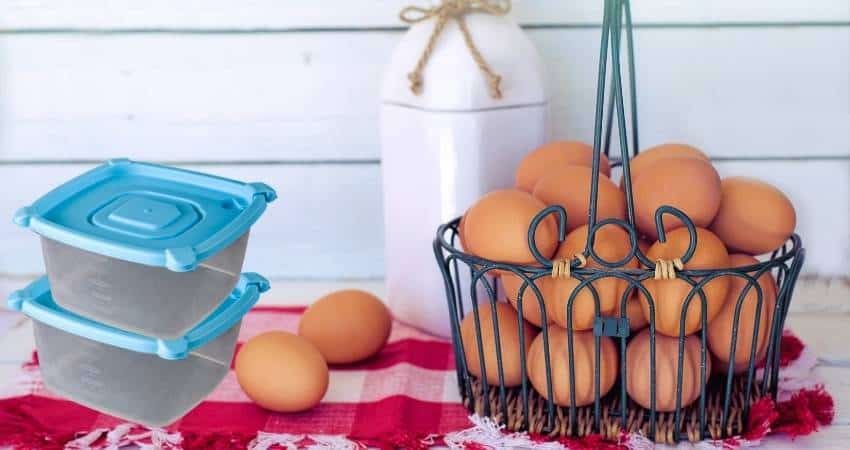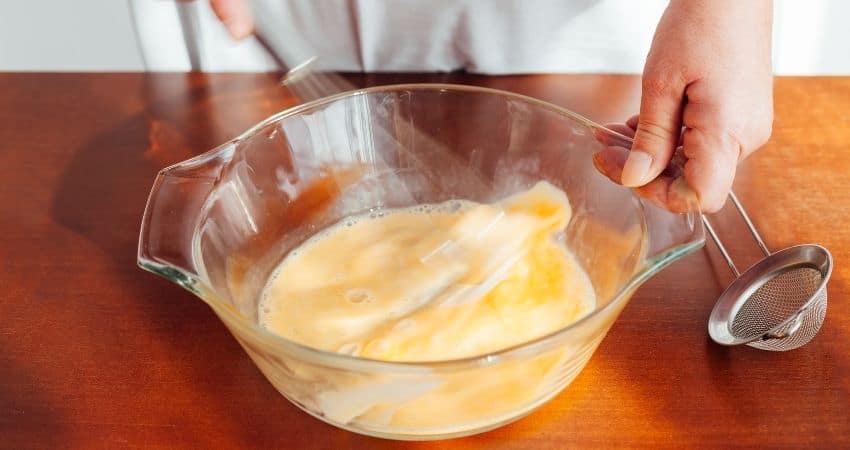Can You Store Eggs in Tupperware?
You probably have these containers already and are asking the question, can you store eggs in Tupperware?
Eggs can be kept in Tupperware if they are stored in the freezer. Freezing eggs is a brilliant way to prevent contamination from foreign flavors and keep eggs fresh for months. Lidded Tupperware provides an airtight environment preventing moisture from seeping into the beaten eggs.
If you want to learn more about long-term egg storage, you couldn’t be in a better place. As a Certified Health Coach many people ask me about this topic. Also, I purchase and store eggs myself. Read on as we discuss some of the best ways to keep your eggs fresh and tasty.
Can You Store Eggs at Room Temperature?

In Tupperware or not, the storage tips in this article are for any container used. Although some people prefer storing eggs at room temperature, refrigerator storage is highly recommended since it reduces bacterial infection risks.
Salmonella is a common, potentially harmful bacteria that inhabit the intestinal tract in most warm-blooded animals1. Both chicken and eggs are known to cause Salmonella. For instance, as revealed in salmonella research, eggs were responsible for 77% of salmonella cases in the US in the 1980s2.
Storing eggs below 40°F (7°C) is enough to halt Salmonella’s development and spread3. Although most eggs are usually treated before they hit the shelves, there is usually a high risk of salmonella bacteria developing, especially if the shells are exposed to moisture.
Disclaimer, you shouldn’t interchange between storing eggs in the refrigerator and at room temperature since doing so can lead to the formation of condensation droplets on the shell, which often leads to bacteria formation.
How to Store Whole Eggs
Leave Eggs in Their Original Packaging
See that packaging that your eggs come in? Don’t throw it away yet- it’s highly useful! You’ll find that most eggs come packed in unique cartons made from composite material. Besides protecting your eggs from breakage, the carton helps prevent it from absorbing odors from strong-scented ingredients like garlic and onions.
So, should you load your eggs into the built-in egg compartment in the fridge? No, you shouldn’t. While arranging eggs in the egg compartment allows for a neat, aesthetically appealing appearance, the compartments don’t help preserve maximum freshness and taste. Store them in their original container4.

Ensure the Large-End Is Up When Storing Eggs
Storing eggs with the bulbous end on top helps to keep the yolk centered. A well-centered yolk reduces the risk of breakage, leaving the egg fresh and tasty.
As much as eggs might appear stable and solid outside, they contain air pockets inside that play a massive role in determining freshness. Due to this, you should avoid moving or repositioning your eggs too much5.
Store Eggs on the Refrigerator’s Central Shelf
You shouldn’t store your eggs on the fridge door if you intend to keep them fresh for weeks to a month. Although the fridge door is ideal for storing some ingredients, placing eggs isn’t advisable due to the temperature inconsistencies associated with opening and closing the door.
The rapid temperature changes can lead to condensation on the shell, resulting in precipitation to seep through the tiny shells.
The middle shelf is usually the most consistent area in a refrigerator’s main compartment ((USDA: How long can you store eggs in the refrigerator?)). Ideally, you should place your eggs towards the middle shelf’s back, which is cold and stable enough to keep your eggs in tip-top shape.
Get Rid of the Storage Carton Once Your Egg Supply Runs Out
Eggshells are permeable, which makes storing eggs fairly challenging6. Improper storage can lead to bacteria’s formation on eggshells, meaning you’ll need to be extra careful about where you place your eggs.
Egg cartons are usually inspected by the Food Safety and Inspection Service to ensure that they meet the required safety standards7. Always keep the packaging that comes with your eggs, and don’t hesitate to throw it out once your supply runs out.
How to Store Beaten Eggs
The good thing about eggs is that they can be stored in different forms. If you want to store eggs and keep them fresh for months, you’ll need to break the shells and place the whites and yolks in airtight tupperware containers.

Separate the Yolks and the Whites
This technique is ideal if you plan to use the eggs in various culinary projects later on. Storing yolks and whites in separate dishes will allow you to pick your preferred ingredient without using the entire egg. For this method to work, you’ll need to be careful when beating the eggs to avoid puncturing the yolks.
Two pieces of Tupperware will come in handy when storing yolks and whites separately in the freezer.
Mix Up the Yolk and Whites
If you aren’t following a specific recipe that requires yolks or whites independently, you can opt to store the eggs as a whole. To store eggs using this method, beat and whip them repeatedly until they integrate fully, making a well-blended solution.
Once you’re done mixing the yolks and whites, place the solution in Tupperware and seal tightly before placing the container in the freezer. You should place the Tupperware at the back of the freezer if you aren’t planning on using the eggs any time soon.
Add Salt or Sugar to Prevent Yolks From Hardening
When frozen, egg yolks tend to congeal, which in turn reduces taste and flavor. Adding a pinch of sugar or salt will help prevent the bonding and solidification of proteins inside the yolks8.
You should add salt if you intend to utilize the eggs for savory dishes. But if you plan to use the eggs to prepare desserts and sweet confections for others, then you should add sugar to your beaten eggs. Please note that the amount of sugar or salt you put in the eggs should vary depending on the number of eggs beaten.
How Long Can You Keep Eggs?
- Whole Eggs: You shouldn’t attempt to freeze eggs in their shells. Always check the best before date on your packaging to know the best time to use your eggs. But whole eggs can last for anywhere between 3 to 5 weeks when refrigerated9.
- Leftover yolks or egg whites: In case you don’t use all your beaten eggs in a recipe, it is advisable to refrigerate the yolks and whites as soon as possible. Raw whites and yolks stored in the normal fridge compartment can stay fresh for up to four days10. However, the raw egg whites and yolks can last up to a year when frozen.
- Cooked eggs or dishes with eggs as ingredients: It isn’t advisable to store cooked leftovers in the freezer section. Instead, put the leftovers in an airtight Tupperware and place them on the fridge’s central shelf. Foodsafety.org insists that all cooked egg dishes should be consumed within three days after fridge storage11.
- Hard-boiled eggs: Fridge storage should keep your hard-boiled eggs fresh for up to one week. However, hard-boiled or cooked eggs shouldn’t be stored in the freezer since cooked whites and yolks don’t freeze well when in solid form.
If you have any questions to ask me about this article don’t hesitate to comment below or email us. You can find an email on our contact page.
Read Next – More Food Storage & Eggs Articles!
How to Store Your Eggs in Lime Water: 6 Easy Steps
Can You Store Eggs in Tupperware?
Organic Eggs Vs. Free Range Eggs
Organic Eggs Vs Pasture Eggs: A Comparison
Eggs vs Oatmeal – Which is Better? Let’s Compare
4 Delicious Ways To Cook Fried Eggs
- National Center for Biotechnology Information: Salmonella and Eggs: From Production to Plate [↩]
- National Center for Biotechnology Information: Salmonella Enteritidis Infections, United States, 1985-1999 [↩]
- USDA: Shell Eggs from Farm to Table [↩]
- FDA: What You Need to Know About Egg Safety [↩]
- Virginia Tech: Proper Handling of Eggs: From Hen to Consumption [↩]
- National Center for Biotechnology Information: Eggshell permeability: a standard technique for determining interspecific rates of water vapor conductance [↩]
- FDA: Eggs Guidance Documents & Regulatory Information [↩]
- USDA: Can I freeze egg yolks? [↩]
- USDA: How long can you store eggs in the refrigerator? [↩]
- USDA: How do you handle and store eggs safely? [↩]
- USDA: Egg Products and Food Safety [↩]
